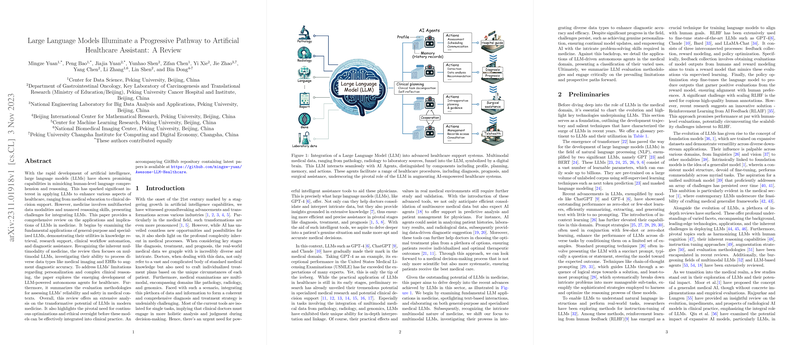Exploring the Potential of LLMs in Healthcare Applications
The paper "LLMs Illuminate a Progressive Pathway to Artificial Healthcare Assistant: A Review" provides a detailed examination of the current landscape and future potential of LLMs in the medical domain. It presents a systematic analysis of the introduction of LLMs into healthcare, highlighting their applications, challenges, and future directions.
The paper systematically introduces the diverse applications of LLMs in medicine. It first focuses on the deployment of general-purpose and specialized medical LLMs, which contribute significantly to areas such as knowledge retrieval, research support, clinical workflow automation, and diagnostic assistance. These models have demonstrated their ability to analyze extensive datasets, derive insights, and facilitate advanced operations. Notably, GPT-4 and Med-PaLM have exhibited commendable performance in medical examinations and diagnostics, underscoring the capability of LLMs in interpreting complex medical information and supporting healthcare professionals in decision-making.
Recognizing the inherently multimodal nature of healthcare data, the authors delve into the field of multimodal LLMs that integrate diverse data types, such as imaging, clinical narratives, and pathology reports, to enhance diagnostic accuracy. The taxonomy of data modality usage elucidates how MLLMs leverage imaging and other structured and unstructured data to provide comprehensive diagnostic analyses. Noteworthy is the versatility of models like BiomedGPT and Med-PaLM M, which demonstrate the potential to process diverse biomedical data and perform various tasks effectively.
Despite their promising capabilities, LLMs in healthcare face certain challenges. These include limitations in reasoning, personalization, real-time knowledge updates, and practical integration into clinical workstreams. To address these concerns, the paper explores the emerging arena of LLM-driven autonomous agents. These agents, equipped with modules for planning, memory, and tool usage, exemplify a move towards more sophisticated, highly specialized medical AI systems capable of operating with minimal human intervention.
The paper emphasizes the importance of continuous evaluation of LLMs to ensure their reliability, safety, and ethical deployment in the medical domain. Comprehensive evaluation frameworks, incorporating standard metrics, expert assessments, and real-world testing, are indispensable for assessing their applicability in clinical settings. Emphasis is also placed on the critical need for these models to adapt to evolving clinical knowledge and maintain an ethical alignment with healthcare practices.
In conclusion, LLMs and their sophisticated variants hold transformative potential for the enhancement of healthcare operations, from improved workflow efficiencies to augmented diagnostics and decision-making processes. However, realizing this potential requires ongoing development and ethical oversight to ensure these models provide accurate, unbiased, and safe healthcare solutions. The paper serves as a pertinent overview of the benefits and challenges posed by LLMs in healthcare, offering a comprehensive reference for researchers and practitioners seeking to integrate these models into clinical practice. As the field progresses, the balance between leveraging LLM capabilities and maintaining human oversight remains paramount to achieving effective and equitable healthcare delivery.
